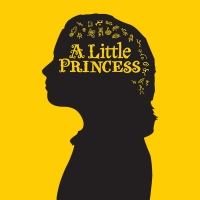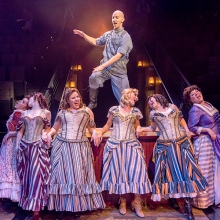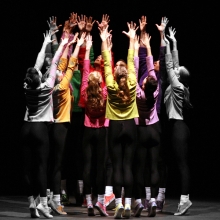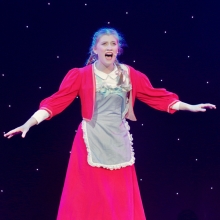
Full Synopsis
Act One
Sara is in trouble from the outset. She has been sent to her room without supper for coming to the table barefoot. Becky, a young maid about the same age, smuggles a muffin upstairs to Sara and peppers her with questions about what life was like in Africa.
Everyone else at the London school has been stand-offish, so Sara is glad to answer the questions and invites Becky to picture the send-off that she received from her friends in Fort St. Louis ("Good Luck, Bonne Chance"). After the townspeople wish her the best, Sara's father, Captain Crewe, bids her a private farewell. He reveals that he must send her to London, as he is embarking upon a mission of exploration to the forbidden city of Timbuktu. He promises that, once the Saharan trek is over, he will return to London to fetch her home ("Soon, My Love"). Sara and Becky's reverie is over when Miss Minchin surprises the two girls. Servants and schoolgirls are not meant to mix; Minchin asks Becky to fetch her cane. Sara protests that her father's instructions were that she was not to be corporally punished. Miss Minchin replies that she is aware of the instructions and will beat Becky in Sara's stead. Between the bare feet and illicit camaraderie, Minchin is convinced that Sara has no idea how to behave in a civilized fashion. She therefore forbids Sara to speak to anyone without permission. Once the monstrous headmistress leaves, Sara vents her frustration ("Live out Loud").
The next day, the other schoolgirls corner Becky and demand to know everything that she learned about Sara. The girls are envious of Sara's wealth and her privileges – she's out riding a pony while the rest take their exercise in a courtyard – but curious, as well. Lavinia, the oldest and meanest of the girls, threatens to harm Becky just as Sara returns from her ride. Lavinia backs down when she sees Sara's riding crop. She continues to tease Becky, though, joking about the accident that left Becky an orphan.
To comfort Becky, Sara confides her own mother is deceased. She offers to help Becky get in touch with her mother's spirit. Miss Amelia, Miss Minchin's sister, can't resist this idea. Sara begins to tell the girls how to contact spirits. Her tales are so vivid that they seem to come to life. Soon, the schoolgirls are joined by imagined Africans in a joyous dance; a spirit enjoins Becky to let her heart be her compass ("Let Your Heart Be Your Compass"). It is Sara's first success with the other schoolgirls but it is short-lived. During the dance, Lavinia leaves to fetch Miss Minchin, who arrives, furious. As part of Sara's punishment, Minchin tears a letter from Captain Crewe into pieces. She also sends Becky to the workhouse.
In Africa, Captain Crewe is met with one setback after another. His retinue dies off; his trade goods are stolen and he is detained by a tribal leader with deep suspicions as to an Englishman's reasons for being there. Feverish and despairing, Crewe imagines how happy his daughter must be in London ("Isn't That Always the Way").
Sara's defense of Becky has won her two new confidantes: Ermengarde, who has pieced together Crewe's letter for Sara, and Lottie, the youngest of the schoolgirls, who is intrigued by the doll that Sara brought with her from Africa. Sara enlists their help to create such chaos at school that Becky is recalled from the workhouse and restored to her position. Miss Minchin, realizing that she has been outmaneuvered, believes that all of Sara's advantages come to her because she has been born lucky ("Lucky").
Meanwhile in Sara's room, Ermengarde and Lottie apologize to Becky for their past transgressions against her and promise to be her friends in future, just as Sara is. Becky is cowed at first. Sara assures her that wealth and position are mere "accidents of birth," and Becky is willing to agree that, even if it were the other way around, she and Sara would have wound up friends ("The Tables Were Turned"). Time passes, and Sara's birthday arrives. Miss Minchin is a bit more disposed to be kind to the girl; rumors have reached London that Captain Crewe made it to Timbuktu. Minchin has made a small fortune on the resultant stock market speculation. Sara's classmates are fascinated by a large box from the London docks that turns out to be full of presents that Sara has ordered for the other girls.
There is no time to enjoy them. A barrister brings news that, not only did Crewe never make it to Timbuktu, he died in disgrace. At a stroke, Sara is left a penniless orphan, and Miss Minchin's own fortune disappears. She decides, rather than put Sara out on the street, to make her a serving girl, sell all of her things and house her in a dark attic room. Sara does not believe what she has been told and is determined to find out the truth ("Soldier On").
Act Two
Lottie visits Sara in her new room just before the Christmas holiday. She is shocked by the drab, cold attic. Sara comforts her by describing it as a new, exciting place full of unexpected magic ("Another World"), although, once Lottie leaves, the depressing reality of it returns.
Downstairs, the schoolgirls are dressed in their best, ready for a holiday. It is almost Christmas ("Almost Christmas"), and all that they can think of are the presents awaiting them at home. Sara is sent out on a cold Christmas Eve to buy a goose for Miss Minchin. She hurries past the happy, last-minute shoppers, wondering where her father might be. She imagines that she hears Pasko, a friend from St. Louis.
That she does find a goose, and at the last minute, is quite impressive to Miss Amelia. She suggests sharing the holiday meal with Sara, who angers Miss Minchin. Miss Amelia resolves to leave the school and find a way to have Sara released; she tells the child how she and her sister once played at being virtuous little princesses too ("Once upon a Time"). Miss Amelia leaves. Miss Minchin sends Sara to her room but mourns her hollow victory over the girl ("Lucky – Reprise"). She locks Sara and Becky in the attic for the night.
Sara is disconsolate. Becky tries to use Sara's doll to invoke the magic of the imagination, to comfort Sara the way that she has been comforted, herself; nothing happens. Sara goes to sleep while Becky mourns the powerlessness of the broken doll ("Broken Old Doll").
The two girls sleep. Pasko sneaks in through the window, bringing food, firewood and blankets to the girls. While he does so, Sara and Becky dream of fantasy Africans bearing more exotic objects and luxuries... and of Captain Crewe becoming a hero by reaching his destination ("Timbuktu"). Becky and Sara awake from the dream, smelling the breakfast that Pasko has left them. They are startled to see him. Becky screams. Miss Minchin comes up to investigate. Pasko promises that things will get better as he and Sara escape over the rooftops ("Soon"). Becky, afraid of heights, stays behind but promises to meet them later.
When Becky doesn't show up at the appointed meeting place, Sara and Pasko return to the school for her... but Becky has managed to escape the school. Miss Minchin seizes Sara and determines to have her and Pasko arrested. Becky arrives with the highest authority in the land, Queen Victoria, whom she has waylaid and regaled with stories of the cruel headmistress. It is Minchin who is arrested. Victoria acknowledges, just before Sara returns to Africa, that anyone can be a princess if their hearts are open and their actions true ("Finale").
Show History
Inspiration
A Little Princess, with book and lyrics by Brian Crawley and music by Andrew Lippa, is based on Francis Hodgson Burnett's early twenty-first-century children's novel of the same name. The story has been adapted into several different works, most famously as a Shirley Temple film in 1936. In creating the musical, Crawley and Lippa made several changes to the original plot. The alterations range from making Sara older to changing Sara's first home from India to Timbuktu, giving them a chance to incorporate more African-American roles into the show.
Productions
A Little Princess premiered at the Mountain View Center for the Performing Arts in Mountain View, California, on August 28, 2004. Produced by TheatreWorks, it starred Mackenzie Mauzy and Will Chase. The production aimed to have a Broadway premiere, when Dodger Theatricals, responsible for producing The Secret Garden, came on board; but the creators were ultimately left hanging. In September 2005, the musical was featured in the Festival of New Musicals, an event in New York City sponsored by the National Alliance for Musical Theatre that nurtures the development and production of new musicals.
Shortly after releasing the world-premiere studio recording of the musical, a new version premiered at Texas State University. Conducted by composer, Andrew Lippa, and functioning in a concert staging, it gave the creators the opportunity to finalize the script, score and orchestrations, in addition to creating new material. The production ran from October 16-19, 2011. Since then, it has had its Boston premiere with the Fiddlehead Theatre on November 21, 2013.
Trivia
- Celebrities that have starred in A Little Princess, including its world premiere recording, include: Sierra Boggess, Julia Murney, Laura Benanti, Titus Burgess, Remy Zaken and Jesse Nager.
Critical Reaction
"Lovely melodic music by Andrew Lippa. ...A Little Princess has much going for it.... We need this kind of family musical to bring parents and children to live theatre."
– Talkin' Broadway
"A Little Princess is exuberant, lively.... Lyricist Brian Crawley and composer Andrew Lippa have re-conceived and re-imagined the tale, expanding it beyond the confines of Victorian England."
– Berkeleyside
"Lippa... captures the unfettered yearning of childhood in music achingly driven by African drumbeats."
– The Mercury News
Connect
Billing
- Book and Lyrics by
- Music by
Based on the novel by Frances Hodgson Burnett
Requirements
(100%)
|
Books & Lyrics By
BRIAN CRAWLEY
(50%) |
Music By
ANDREW LIPPA
(50%) |
Video Warning
In accordance with the Performance License, you MUST include the following warning in all programs and in a pre-show announcement:ANY VIDEO AND/OR AUDIO RECORDING OF THIS PRODUCTION IS STRICTLY PROHIBITED.
Included Materials
| Item | Quantity Included |
|---|---|
| AUDIO GUIDE | 1 |
| LIBRETTO/VOCAL BOOK | 25 |
| PIANO CONDUCTOR'S SCORE | 1 |
| PIANO VOCAL SCORE | 1 |
Production Resources
| Resource |
|---|
| HOW DOES THE SHOW GO ON-10/CS |
| KEYBOARDTEK |
| PRODUCTIONPRO-DIGITAL SCRIPT/SCORE |
| REFERENCE RECORDING |
| STAGE WRITE APPLICATION |
| TRANSPOSITIONS-ON-DEMAND |
STANDARD ORCHESTRATION
| Instrumentation | Doubling |
|---|---|
| BASS | ACOUSTIC BASS , ELECTRIC BASS |
| CELLO | |
| DRUMS | AFRICAN HAND DRUM , CABASA , CROTALES , DRUM KIT , ELECTRONIC DRUM PAD , FINGER CYMBALS , LOG DRUM , SMALL COW BELL , TAM-TAM , TEMPLE BLOCKS , TRIANGLE , 4 WOOD BLOCKS |
| HARP | |
| HORN | |
| KEYBOARD 1 | |
| KEYBOARD 2 | |
| PERCUSSION | AFRICAN HAND DRUMS , AFUCHE , BELLS , BONGOS , CROTALE BOARD , DEM BEK , DJEMBE , ELECTRONIC DRUM PAD , FIELD DRUM , GLOCKENSPIEL , MARIMBA , MARK BELLS , MARK TREE , ORCHESTRA BELLS , SHAKER , SLAPSTICK , SLEIGH BELLS , SMALL TRIANGLE , SUSPENDED CYMBAL , TAM-TAM , TEMPLE BLOCKS , TIMPANI , TRIANGLE , TUBULAR BELLS , TUMBA , XYLOPHONE |
| REED 1 | ALTO SAXOPHONE , CLARINET , ETHNIC FLUTE , FLUTE , PICCOLO |
| REED 2 | CLARINET , ENGLISH HORN (OPT.) , FLUTE , OBOE (OPTIONAL) , TENOR SAXOPHONE |
| REED 3 | BARITONE SAXOPHONE , BASS CLARINET , BASSOON (OPTIONAL) , CLARINET |
| TRUMPET | FLUGELHORN , TRUMPET |
| VIOLIN |




